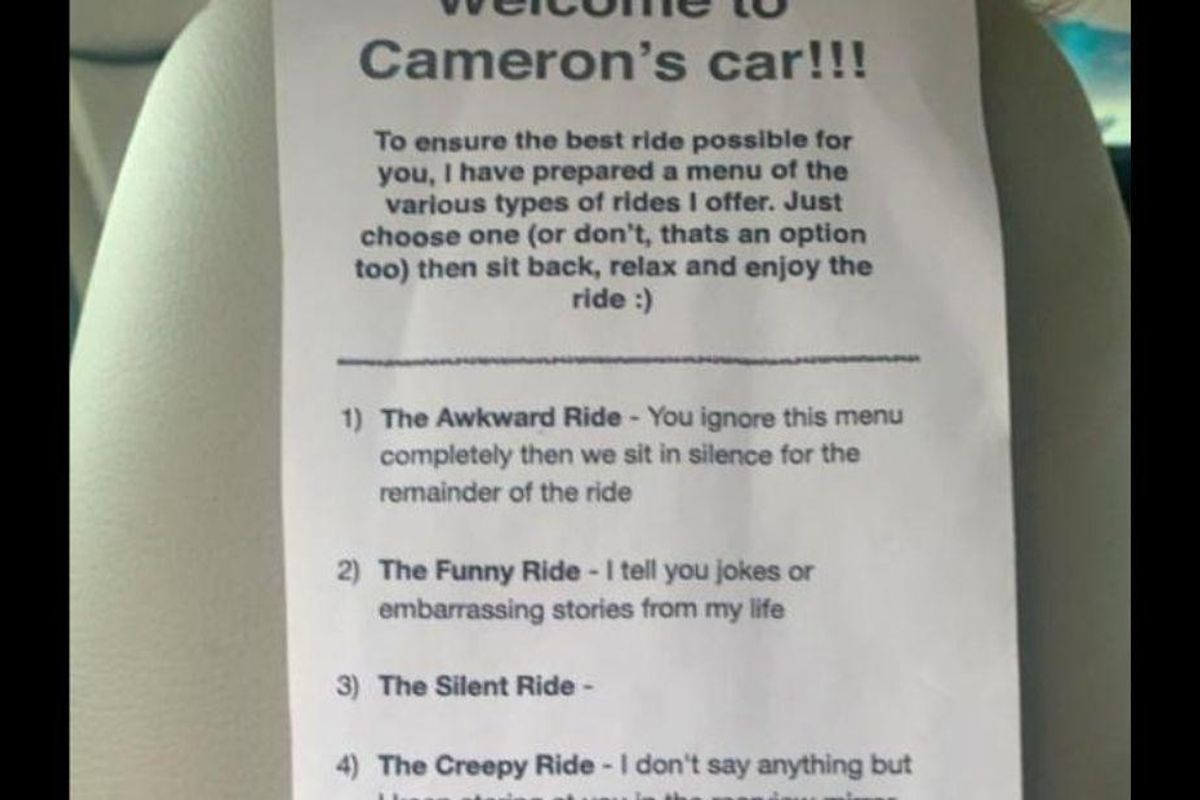Lyft driver's hilarious menu of 10 different types of ride options is pure genius
All Uber and Lyft drivers should have a ride options menu.

Cameron the creative Lyft driver offers a variety of ride options to his passengers.
Have you ever ridden in an Uber or a Lyft and had the driver talk a lot when you felt like being quiet? Or not say a word when you tried to make conversation? Or play music you found annoying?
When you hop into a driver's car, it's a crapshoot what kind of ride you're going to have. But at least one Lyft driver is removing the mystery a bit by letting passengers choose.
Facebook user Eric Alper shared a post that showed a photo of a piece of paper stuck on the back of a car's headrest that read:
"Welcome to Cameron's car!!!"
"To ensure the best ride possible for you, I have prepared a menu of the various types of rides I offer. Just choose one (or don't, that's an option too) then sit back, relax and enjoy the ride. :)"
Then it listed the 10 ride options Cameron offers:
1. The Awkward Ride - You ignore this menu completely, then we will sit in silence for the remainder of the ride.
2. The Funny Ride - I tell you jokes or entertaining stories from my life.
3. The Silent Ride -
4. The Creepy Ride - I don't say anything but I keep staring at you in the rearview mirror.

Cameron's charming list of options.
5. The Karaoke Ride - We rock out to hits from the 80s, early 2000s or literally whatever you want.
6. The Bubbles Ride - We blow bubbles the whole time.
7. The Small Talk Ride - We talk about how crazy the weather's been lately and I ask if you caught the game last night.
8. The Therapy Ride - You vent to me about your problems and I listen.
9. The Drunk Ride - You throw up in my car.
10. The Cliche Ride - You ask me how long I've been driving for Lyft."
OK, the Bubbles Ride sounds fun, but also maybe a little dangerous. And the Drunk Ride is the main reason I've never wanted to be a Lyft or Uber driver. I may have unintentionally taken a both a Therapy Ride and a Creepy Ride before.
But seriously, the concept is fabulous. People often want something different in a ride depending on their mood, so the idea of having options to choose from is brilliant. The list also directly addresses the awkwardness that is often present when you're getting a ride from someone, so it makes a natural icebreaker and conversation starter—particularly helpful for folks who struggle with social anxiety.
People in the comments loved it.
"I'm sure this wasn't the intention but this is a great example of disability accommodations that everyone can enjoy," wrote one person. "Being able to choose how much energy I expend is so helpful."
"There should be a feature on both Uber and Lyft indicating what type of ride a rider wants or expects," wrote another. "I usually don't talk, but sometimes the driver keeps persisting and I feel awkward at times."
"It clears the air, takes the awkwardness out of it, and establishes expectations for the ride, on both sides," wrote another. "Great idea."
There are some more options I'd love to see added, though:
The Pep Talk Ride - You need encouragement? I'll give you everything I've got to pump you up.
The Tour Guide Ride - I share interesting details about places we pass and offer advice on cool things to do around the area.
The Life Story Ride - We estimate how long your ride will be, set a timer, and each of us shares our life story for half the ride. (No questions, unless the ride goes longer.)
The Deep Questions Ride - We skip the small talk and get right to the big stuff—meaning of life, existence of God, our place in the universe, etc.
The High School Debate Ride - We pick a controversy, flip a coin to decide who will take which side, and debate regardless of our own personal views.
The Pretend Persona Ride - We each make up totally fake names and personas and converse as them so we can chat without actually getting personal at all.
So many possibilities. What kind of ride would you want to take?
This article originally appeared three years ago.
- Women are sharing the mental checklists they run through to ... ›
- Lyft providing free rides to help low-income people get to job ... ›
- Edgar the Lyft driver showed how to perfectly respond to an ... ›
- Rearview mirror hack - Upworthy ›
- Younger generations have 'menu anxiety' - Upworthy ›
- Wallace the Uber driver gamifies his car for a unique ride - Upworthy ›
- Granny Lyft driver's funny rules - Upworthy ›

